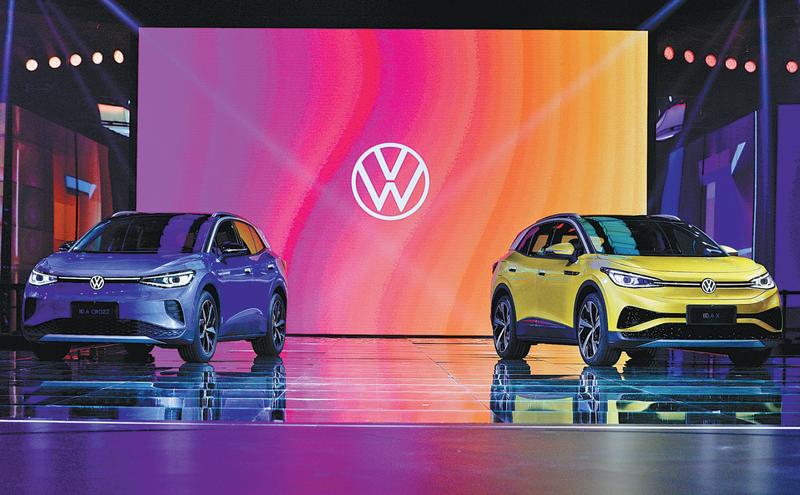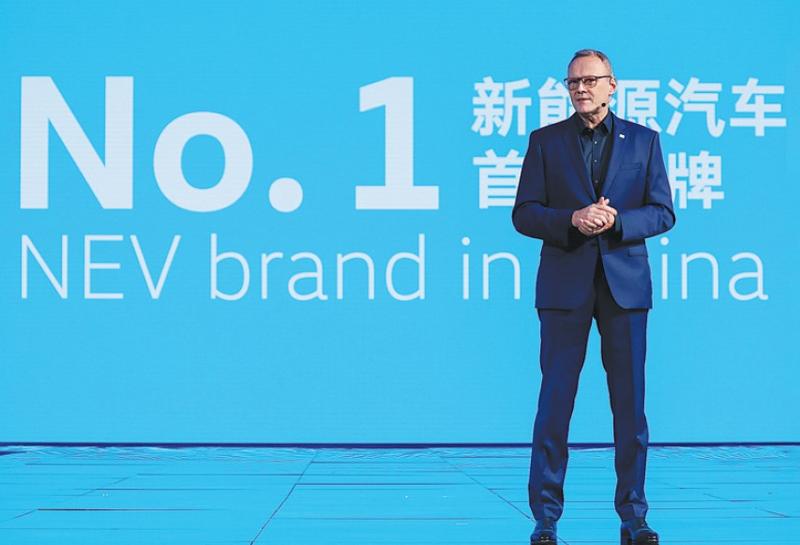 Volkswagen unveils its first China-made MEB-based vehicles, the ID.4 CROZZ and the ID.4 X, on Tuesday in Shenzhen, marking further efforts to realize the German carmaker's ambition to become the most popular new energy vehicle brand in the country. (PHOTO PROVIDED TO CHINA DAILY)
Volkswagen unveils its first China-made MEB-based vehicles, the ID.4 CROZZ and the ID.4 X, on Tuesday in Shenzhen, marking further efforts to realize the German carmaker's ambition to become the most popular new energy vehicle brand in the country. (PHOTO PROVIDED TO CHINA DAILY)
Volkswagen unveiled its first China-made vehicles based on its electric vehicle-only MEB platform on Tuesday, marking further efforts to realize the German carmaker's ambition to become the most popular new energy vehicle brand in the country.
The models, the ID.4 X from SAIC Volkswagen and the ID.4 CROZZ from FAW-Volkswagen, are expected to become "game-changers" in China's NEV market.
Built on the MEB platform, the models have a range of more than 550 kilometers on one charge and are capable of over-the-air software updates.
We are convinced that these ID. family models can fundamentally change the automotive market
Stephan Woellenstein, CEO of Volkswagen Brand China and Volkswagen Group China
They feature driving assist systems and smart operating systems that understand natural language demands. In terms of charging, the vehicles can get an 80 percent charge within 45 minutes using fast-charging poles.
Volkswagen is building charging facilities across China through its joint venture CAMS.
By the end of this year, it will have more than 250 charging stations offering more than 1,800 dual-connector charging poles in 16 cities across the country.
READ MORE: Volkswagen-SAIC to revamp Shanghai plants to make Audi sedans
The two models are scheduled to hit the market in the first quarter of 2021.
And the prices of them will be competitive, according to the automaker.
"We are Volkswagen, which means cars for the people, not for the millionaires," Volkswagen Brand China CEO Stephan Woellenstein said.
Including the two ID.4 models, Volkswagen is planning to introduce a total of eight ID. models on the MEB platform by the end of 2023.
Woellenstein said the number of vehicles the carmaker can offer is another advantage compared with many other automobile startups, which develop vehicles one by one.
"We are convinced that these ID. family models can fundamentally change the automotive market," said Woellenstein, citing Volkswagen's engineering standards and its ability to build cars in large numbers at affordable prices.
ALSO READ: Volkswagen pumps 2b euros into China electric vehicle bet
 Volkswagen Brand China CEO Stephan Woellenstein delivers a speech at the launch event. (PHOTO PROVIDED TO CHINA DAILY)
Volkswagen Brand China CEO Stephan Woellenstein delivers a speech at the launch event. (PHOTO PROVIDED TO CHINA DAILY)
Citing the examples of the ID.4 vehicles, he said Volkswagen engineers spent millions of hours on test benches, and before their production, over 1,000 test models were taken to 35 countries and regions and driven 6 million km to ensure their durability and reliability.
Currently, Volkswagen's two joint ventures, SAIC Volkswagen and FAW-Volkswagen, have a combined production capacity of 600,000 MEB-based vehicles a year, with plants in Shanghai and Foshan, Guangdong province, respectively.
Woellenstein expects Volkswagen to become the No 1 choice in NEVs by around 2025.
"These models will go a long way to meet our aim of becoming the No 1 NEV brand in China, as we already are for both the overall passenger car market and SUVs," he said.
Volkswagen sold 1.95 million vehicles in the first three quarters of the year, accounting for 14.6 percent of the country's total passenger car market, according to statistics from the China Association of Automobile Manufacturers.
Volkswagen is confident that e-mobility is the direction of the future and the market for NEVs in China will boom in coming years.
In the first three quarters of the year, 34,190 Volkswagen-branded NEVs were sold in the country, up 34 percent from the same period of 2019, despite the coronavirus pandemic.
In the same period, total NEV sales in the country were 734,000 in China, according to statistics from the CAAM. The association expects sales this year will reach at least 1 million.
In a development plan released on Monday, China expects sales of electric cars, plug-in hybrids and hydrogen-powered vehicles in the country to rise to 20 percent of new car sales by 2025, from around 5 percent now.
In late September, Woellenstein, who is also CEO of Volkswagen Group China, announced that Volkswagen Group will invest a total of around 15 billion euros (US$17.64 billion) in the country together with its joint ventures SAIC Volkswagen, FAW-Volkswagen and JAC Volkswagen in e-mobility between 2020 and 2024.
The figure comes on top of the 33 billion euros already announced by the group for the development of e-mobility around the globe.
By 2025, the group will produce a total of 15 different new energy models locally in China under brands from Volkswagen to its premium brand Audi.


